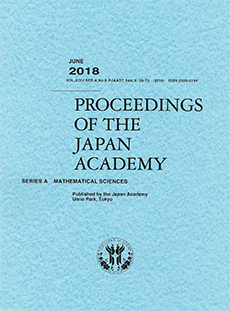Abstract
For a positive integer $k$ and a certain arithmetic progression $A$, there exist infinitely many quadratic fields $\mathbf{Q}(\sqrt{-d})$ whose class numbers are divisible by $k$ and $d\in A$. From this, we have a linear congruence of the representation numbers of integers as sums of three squares.
Citation
Peter Jaehyun Cho. "Sum of three squares and class numbers of imaginary quadratic fields." Proc. Japan Acad. Ser. A Math. Sci. 87 (6) 91 - 94, June 2011. https://doi.org/10.3792/pjaa.87.91
Information





